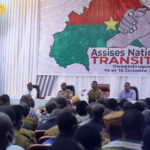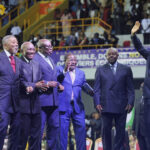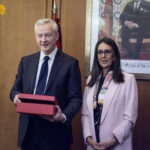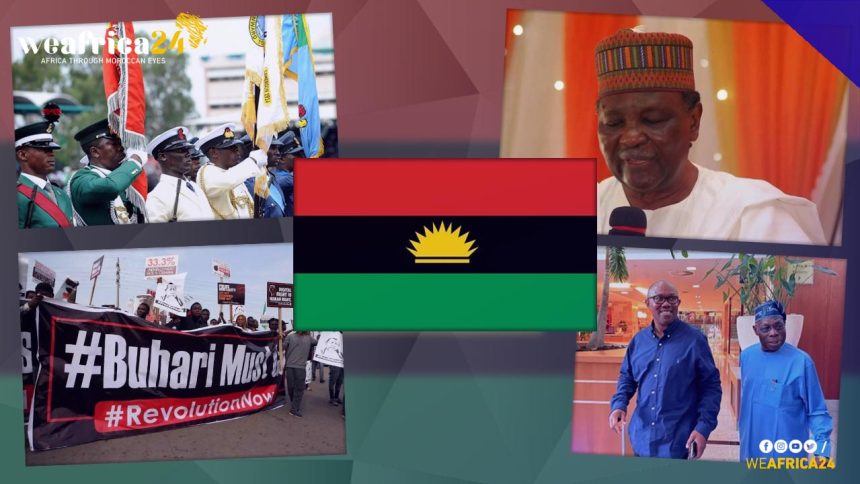Nigeria, the economic giant of Africa and with more than 220 million inhabitants the most populous country on the continent, is electing its president and deputies this Saturday, February 25th. A reminder of the great events that have shaped the recent history of this giant with feet of clay.
1914: did you say “Amalgamation”?
Modern Nigeria was formed in 1914 from the territorial and administrative amalgamation of the Protectorate of Northern Nigeria and the Protectorate of Southern Nigeria under the aegis of the British Crown.
The operation then known as “Fusion” was led by Lord Lugard, Nigeria’s first High Commissioner. The viability of this new entity, named Nigeria, divided into the “Northern Region”, the “Eastern Region” and the “West Region”, has been strongly questioned in the press and by opinion leaders.
For critics, this artificial ensemble was doomed because it brought together far too different peoples and traditions, notably the Igbo in the East, the Yoruba in the West, and the Hausa in the North. Divergences were further accentuated during the colonial period, with northern Nigeria, with a Muslim majority, evolving under a distinct administrative and cultural regime, led by traditional and religious leaders closed on their privileges, while the population of the South, to Christian and animist majority, was educated by the Christian missions and was open to Western influences.
1960: independence and after
Nigeria proclaimed its independence on October 1, 1960, but we had to wait until 1963 to see the advent of the first Republic and the entry into a function of the institutions which the country set up on the model of a British parliamentarian.
These first years of the Nigerian Republic were marked by a sharing of power between the different communities that made up the country.
As illustrated by the appointment to the presidency of Nnamdi Azikiwe, a Christian of Ibo origin and leader of the National Council of Nigeria and Cameroonians (NCNC), representing the Eastern region, and that of Abubakar Tafewa Balwa, representative of the Muslim Northern Party (NPC), at the prime minister’s office, at the head of a coalition government.
In 1963, to better reflect the representativeness of the communities, the federation set up a new Center-West region, but this did not prevent it from sinking rapidly into growing inter-community tensions. Barely born, the country was undermined by the struggles of regional parties for control of central power and by the opposition of the South and northern minorities to the hegemony of the North.
1966: from one coup to another
On January 15, 1966, a handful of “revolutionary” soldiers took advantage of environmental violence to overthrow the federal government after a bloody coup. Prime Minister Abubakar Tafewa Balwa is assassinated and President Nnamdi Azikiwe retired.
Over the next three decades, Nigeria’s history was punctuated by coups and counter-coups. These thirty years are also marked by some of the great tragedies that the country has experienced.
The 1966 coup marked the end of the first Nigerian Republic. However, the generals who set themselves up as the head of the country will not prove more capable than the politicians of bringing peace.
1967-70: the Biafra war
The civil war began when, on May 30, 1967, the Eastern region, the original territory of the Igbo community, seceded and formed the separatist state of Biafra. It was the unrest targeting the Igbo that broke out in the north of the country in the wake of the January 1966 coup that sparked this conflict. These are real anti-Igbo pogroms, which leave tens of thousands dead, while a million others flee to the East.
The issue of the conflict is also economic. The Igbo feared that the administrative and territorial reforms initiated by the Nigerian federal authorities would deprive them of their autonomy in the management of their territory and of access to the immense oil resources of the Delta region.
2015-2023: Buhari’s presidency and the weakening of the country
During the Buhari years, with a GDP of $2,585 per capita, Nigeria surpassed South Africa and became Africa’s leading economy, thanks to soaring oil prices, and also thanks to its prolific cultural sector (Nollywood is the second largest film industry in the world in several films produced, behind Indian Bollywood but ahead of the United States).
In 2015, Buhari was madly selected with a promise to end crime and Boko Haram, but the honeymoon would be short-lived. In 2016, the country entered a recession and the then 74-year-old President fell ill and faded in London hospitals for many months. He has re-elected in 2019 thanks to his political support despite a lackluster economic and security record.
The year 2020 is “annus horribilis”, which begins with extremely strict months of confinement due to Covid, which bring the economy to its knees: the number of people living on less than 2 dollars a day explodes from 83 million in 2019 to more than 130 million (63% of the population). The population revolted in October 2020 around the #EndSARS movement, which first denounced police violence and abuse, then more generally bad governance. The movement is subdued in the blood.
2023, an election year
On February 25, 2023, Nigerians go to the polls to appoint the successor to Muhammad Buhari, elected successively in 2015 and 2019. Four candidates are in the running this time: Bola Ahmed Tinubu of the All Progressive Congress (APC), the ruling party, Atiku Abubakar who is running on behalf of the main opposition party, the People’s Democratic Party (PDP), Peter Obi, the outsider candidate, from the ranks of the PDP, but now a member of the Labor Party.
The fourth candidate, Rabia Kwankwaso, is unlikely to win nationally, but the man is very popular in his state of Kano, the capital of the Muslim-majority north.
Who will be the winner? Will this election perpetuate the two-party system that dominates Nigerian political life or will there be a game-changer with the coming to power of a new political class? These are the questions being asked today in the most populous country on the continent.
The outcome will depend on turnout, observers say. While nearly 40% of registered voters are now under the age of 34, raising the possibility of a revival, many points to the voter apathy traditionally shown by Nigerian voters on polling day.
The country is also experiencing huge security problems in many regions (States of Imo, Anambra, Benue, Katsina, Zamfara, Sokoto, and Borno…) which prevent people from going to vote.







